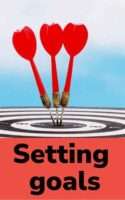How to choose and set a goal for yourself
We all have dreams about what we want to achieve. These dreams can sometimes feel so real, it’s almost as if we are there already. But dreaming isn’t enough – goals take time, effort, patience, and self-knowledge.
Sometimes these dreams are big and include fame, lots of money, good qualifications and an excellent career – and sometimes our dreams can be a lot more down to earth, such as getting the new neighbour’s daughter or son to smile back at you, or saving enough money to visit your friend in a neighbouring town for the weekend. Or to learn to have better control over your temper.
And then all of a sudden, reality hits, and in seconds we are back in the real world, where things are often not easy.
But just maybe it doesn’t always have to be like that. If we choose the right kind of goal, after considering all the different factors, things might not end in disappointment.
But what are the steps in this process? It would be valuable to take a few minutes to write down your answers to the following questions, and by the end you might have a clearer picture of what it is that want to achieve.
Take a look at goals you set before that you reached. Ask yourself what happened, why this worked, and how it made you feel to achieve your goal.
Think of a goal you had that you haven’t reached. What happened? Was it the goal itself, the choices you made, or your circumstances? Is there anything you could have done differently? How much control did you have over the outcome?
What do I want to achieve by setting a goal? You might want to be rich, or famous, or feel good about yourself/feel like a champion, be happy, have more confidence, or feel popular among your friends, or the family will be proud of you, or be able to support yourself. What if the goal doesn’t achieve this? Or what if the goal is what someone else wants for you, rather than what you want for yourself? Keep in mind that success doesn’t always have to do with lots of money – although it is always nice to have enough for the basics.
In what part of my life does my goal fit in? This could be social, financial, physical, education/career, relationships, artistic, personal development. There are so many facets to who you are, and who you can be. Everyone is different.
Why is it a good idea to have more than one goal? Think about it – there are so many different possibilities in life. There might be careers out there that you don’t know about, or opportunities that are not obvious. You may have hidden talents of which you are unaware. Find out as much as you can about new things you can try your hand at. You do not have to follow the same road as everyone else. Be on the lookout – if one thing doesn’t work out, try something else.
What are the things I am good at? What role should this play in my goal-setting? Write down five things at which you are good/ or in which you are interested. They don’t have to be career-oriented. You might be good at telling stories, or fixing things, cycling, or listening to other people, or organising people, you may be very patient, or get on well with older people, finding things on the internet, doing athletics, cooking, drawing, reading maps, making plants grow, looking after animals, solving complex mathematical problems, working out a budget – the list is endless. Why is it important to keep these in mind when choosing and setting a goal?
From your own life, think of an example of a small, medium or big goal. And while you are at it, think of the difference between a long-term and a short-term goal as well and indicate next to each goal which one it is.
Goals
Small __________________________________
Medium ________________________________
Big ____________________________________
In the next article we are going to look at how to achieve your goals, and how to identify and overcome possible obstacles in your way to getting where you want to be.


